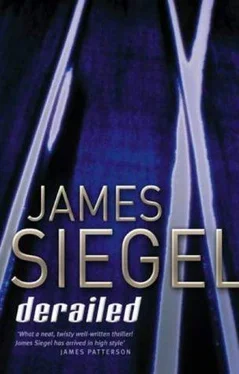DERAILED
BY
JAMES SIEGEL
© 2003
To Mindy, who tends to her family as she tends to her garden — with great love, ceaseless devotion, and unflagging enthusiasm.
ACKNOWLEDGMENTS
I would like to thank both Sara Ann and just plain Sarah for their immense help in structuring this story, Larry for believing in it, and, of course, Richard, for unapologetically championing it.
ATTICA
I spend five days a week teaching English at East Bennington High and two nights a week teaching English at Attica State Prison. Which is to say, I spend my time conjugating verbs for delinquents and dangling participles for convicts. One class feeling like they’re in prison and the other class actually being in one.
On the Attica evenings, I eat an early dinner with my wife and two children. I kiss my wife and teenage daughter good-bye and give my four-year-old son a piggyback ride to the front door. I gently put him down, kiss his soft brow, and promise to look in on him when I get home.
I enter my eight-year-old Dodge Neon still surrounded in a halo of emotional well-being.
By the time I pass through the metal detector at Attica Prison, it’s gone.
Maybe it’s the brass plaque prominently displayed on the wall of the visitors room. “Dedicated to the Correction Officers who died in the Attica riots,” it says. There is no plaque for the prisoners who died.
I have only recently begun teaching there, and I can’t quite decide who’s scarier — the Attica prisoners or the corrections officers who guard them. Possibly the corrections officers.
It’s clear they don’t like me much. They consider me a luxury item, like cable TV, something the prisoners did nothing to deserve. The brainchild of some liberal in Albany, who’s never had a shiv stuck in his ribs or feces thrown in his face, who’s never had to peel a tattooed carcass off a blood-soaked floor swimming with AIDS.
They greet me with barely disguised contempt. It’s the PHD, they mumble. “Pathetic Homo Douchebag,” one of them scrawled on the wall of the visitors bathroom.
I forgive them.
They are the outnumbered occupiers of an enslaved population seething with hatred. To survive this hate, they must hate back. They are not allowed to carry guns, so they arm themselves with attitude.
As for the prisoners who attend my class, they are strangely docile. Many of them the unfortunate victims of the draconian Rockefeller drug laws that treat small purchases of cocaine like violent felonies. They mostly look bewildered.
Now and then, I give them writing assignments. Write something, I say. Anything. Anything that interests you.
I used to have them read their work in class. Until one convict, a sloe-eyed black named Benjamin Washington, read what sounded like gibberish. It was gibberish, and the other convicts laughed at him. Benjamin took offense at this and later knifed one of them in the back over a breakfast of watery scrambled eggs and burnt toast.
I decided on anonymity there and then.
They write what interests them and send it up to the desk unsigned. I read it out loud and nobody knows who wrote what. The writer knows; that’s good enough.
One day, though, I asked them to write something that would interest me. The story of them. How they got here, for instance, to Mr. Widdoes’s English class in the rec room at Attica State Prison. If they wanted to be writers, I told them, start with the writer.
It might be enlightening, I thought, maybe even cathartic. It might be more interesting than the story “Tiny the Butterfly,” a recent effort from . . . well, I don’t know, do I? Tiny brought color and beauty to a weed-strewn lot in the projects until he was, unfortunately, crushed like a bug by the local crank dealer. Tiny, it was explained at the bottom of the page, was cymbollic.
I gave out the assignment on Thursday; by next Tuesday the papers were scattered across my desk. I read them aloud in no particular order. The first story about an innocent man being framed for armed robbery. The second story about an innocent man being framed for possession of illegal narcotics. The third story about an innocent man being framed . . .
So maybe it wasn’t that enlightening.
But then.
Another story. Hardly a story at all (although it had a title); a kind of introduction to a story. An invitation to one, really.
About another innocent man.
Who walked on the train one day to go to work.
When something happened.
ONE
The morning Charles met Lucinda, it took him several moments after he first opened his eyes to remember why he liked keeping them closed.
Then his daughter, Anna, called him from the hallway and he thought: Oh yeah.
She needed lunch money, a note for the gym teacher, and help with a book report that was due yesterday.
Not in that order.
In a dazzling feat of juggling, he managed all three between showering, shaving, and getting dressed. He had to. His wife, Deanna, had already left for her job at P.S. 183, leaving him solely in charge.
When he made it downstairs he noticed Anna’s blood meter and a used syringe on the kitchen counter.
Anna had made him late.
When he got to the station, his train had already left — he could hear a faint rumble as it retreated into the distance.
By the time the next train pulled in, the platform had been repopulated by an entirely new cast of commuters. He knew most of the 8:43 crowd by sight, but this was the 9:05, so he was in alien territory.
He found a seat all by himself and immediately dived into the sports pages.
It was November. Baseball had slipped away with another championship for the home team. Basketball was just revving up, football already promising a year of abject misery.
This is the way he remained for the next twenty minutes or so: head down, eyes forward, brain dead — awash in meaningless stats he could reel off like his Social Security number, numbers he could recite in his sleep, and sometimes did, if only to keep himself from reciting other numbers.
Which numbers were those?
Well, the numbers on Anna’s blood meter, for example.
Numbers that were increasingly and alarmingly sky high.
Anna had suffered with juvenile diabetes for over eight years.
Anna wasn’t doing well.
So all things being equal, he preferred a number like 3.25. Roger-the-Rocket-Clemens’s league-leading ERA this past season.
Or twenty-two — there was a good round number. Latrell Sprewell’s current points per game, accumulated, dreadlocks flying, for the New York Knicks.
Numbers he could look at without once feeling sick.
The train lurched, stopped.
They were somewhere between stations — dun-colored ranch houses on either side of the track. It suddenly occurred to him that even though he’d ridden this train more times than he cared to remember, he couldn’t describe a single neighborhood it passed through. Somewhere along the way to middle age, he’d stopped looking out windows.
He burrowed back into the newspaper.
It was at that exact moment, somewhere between Steve Serby’s column on the state of the instant replay rule and Michael Strahan’s lamentation on his diminishing sack total, that it happened.
Later he would wonder what exactly had made him look up again at that precise moment in time.
He would ask himself over and over what would have happened if he hadn’t. He would torture himself with all the permutations, the what ifs and what thens and what nows.
Читать дальше












